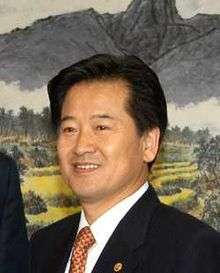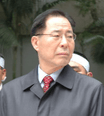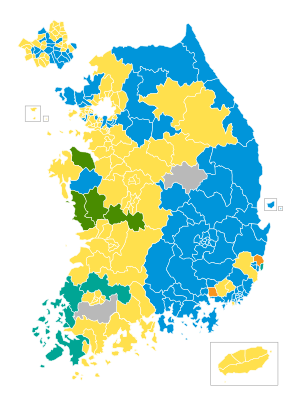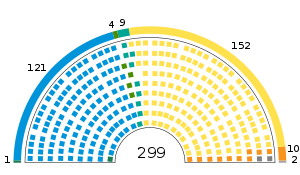South Korean legislative election, 2004
| |||||||||||||||||||||||||||||||||||||||||||||||||
All 299 seats to the National Assembly of South Korea 150 seats needed for a majority | |||||||||||||||||||||||||||||||||||||||||||||||||
| |||||||||||||||||||||||||||||||||||||||||||||||||
|
| |||||||||||||||||||||||||||||||||||||||||||||||||
|
■ Uri Party ■ GNP ■ DLP ■ ULD ■ MDP ■ National 21 ■ Others | |||||||||||||||||||||||||||||||||||||||||||||||||
 |
| This article is part of a series on the politics and government of the Republic of Korea |
| Constitution |
|
Judiciary 
|
|
Legislative elections were held in the Republic of Korea (South Korea) on April 15, 2004. In the 17th election for the National Assembly, voters elected 299 members of the legislature. The newly formed Uri Party and other parties supporting President Roh Moo-hyun, who was impeached by the outgoing National Assembly, won a majority of seats. This was the first time a centre-left liberal party won a majority in the National Assembly.
Results
| Parties | Votes | % | +/− | Seats | +/− |
|---|---|---|---|---|---|
| Uri Party (열린우리당, Yeollin Uri-dang) | 8,145,824 | 38.3 | — | 152 | +105 |
| Grand National Party (한나라당, Hannara-dang) | 7,613,660 | 35.8 | −3.2 | 121 | −24 |
| Democratic Labour Party (민주노동당, Minju Nodong-dang) | 2,773,769 | 13.0 | — | 10 | +10 |
| Millennium Democratic Party (새천년민주당, Saecheonnyeon Minju-dang) | 1,510,178 | 7.1 | −28.8 | 9 | −53 |
| United Liberal Democrats (자유민주연합, Jayu Minju Yeonhap) | 600,462 | 2.8 | −7.0 | 4 | −6 |
| Others | 642,091 | 0.3 | — | 3 | −6 |
| Total (60 % out of 35,596,497 registered voters) | 21,285,984 | 100.0 | 299 |
Left Center Right
Note: Changes in seats are the figures compared with the number of seats each party occupied as of 12 March 2004. In addition, the number of seats in the National Assembly has been increased from 273 to 299.
Parties
The newly formed Uri Party (Uri-dang or Our Party) gained support through its opposition to the impeachment of President Roh. It won 32 out of 49 seats in Seoul, 44 out of 62 in Incheon and Gyeonggi, confirming that a majority of voters supported the President.
The conservative Grand National Party, which supported the impeachment of Roh, suffered a loss of support, but won a majority in North Gyeongsang and South Gyeongsang regions and retained the 100 seats necessary to block constitutional changes.
The Democrat Labour Party won only 10 seats, but this was considered a great triumph considering that South Koreans are traditionally anti-communist and against left-wing policies.
The Millennium Democratic Party, formerly the major liberal party, was the second-largest party prior to the election but sustained the biggest loss in the backlash following its leading role in the impeachment of Roh, as much of its support shifted to the Uri Party.
The United Liberal Democrats, a regional party based on North Chungcheong and South Chungcheong regions, has lost support since its leader, Kim Jong-pil, did not contest the last presidential election.
Result by region
| |Region | Uri Party | GNP | DLP | MDP | ULD | Others | Total |
|---|---|---|---|---|---|---|---|
| Seoul | 32 | 16 | - | - | - | - | 48 |
| Busan | 1 | 17 | - | - | - | - | 18 |
| Incheon | 9 | 3 | - | - | - | - | 12 |
| Daegu | - | 12 | - | - | - | - | 12 |
| Gwangju | 7 | - | - | - | - | - | 7 |
| Daejeon | 6 | - | - | - | - | - | 6 |
| Ulsan | 1 | 3 | 1 | - | - | 1 | 6 |
| Gangwon-do | 2 | 6 | - | - | - | - | 8 |
| Gyeonggi-do | 35 | 14 | - | - | - | - | 49 |
| South Gyeongsang | 2 | 14 | 1 | - | - | - | 17 |
| North Gyeongsang | - | 19 | - | - | - | 1 | 20 |
| South Jeolla | 7 | - | - | 5 | - | 1 | 13 |
| North Jeolla | 11 | - | - | - | - | - | 11 |
| South Chungcheong | 5 | 1 | - | - | 4 | - | 10 |
| North Chungcheong | 8 | - | - | - | - | - | 8 |
| Jeju | 3 | - | - | - | - | - | 3 |
| Proportional representation |
23 | 21 | 8 | 4 | - | - | 56 |
| Total | 152 | 121 | 10 | 9 | 4 | 3 | 299 |






